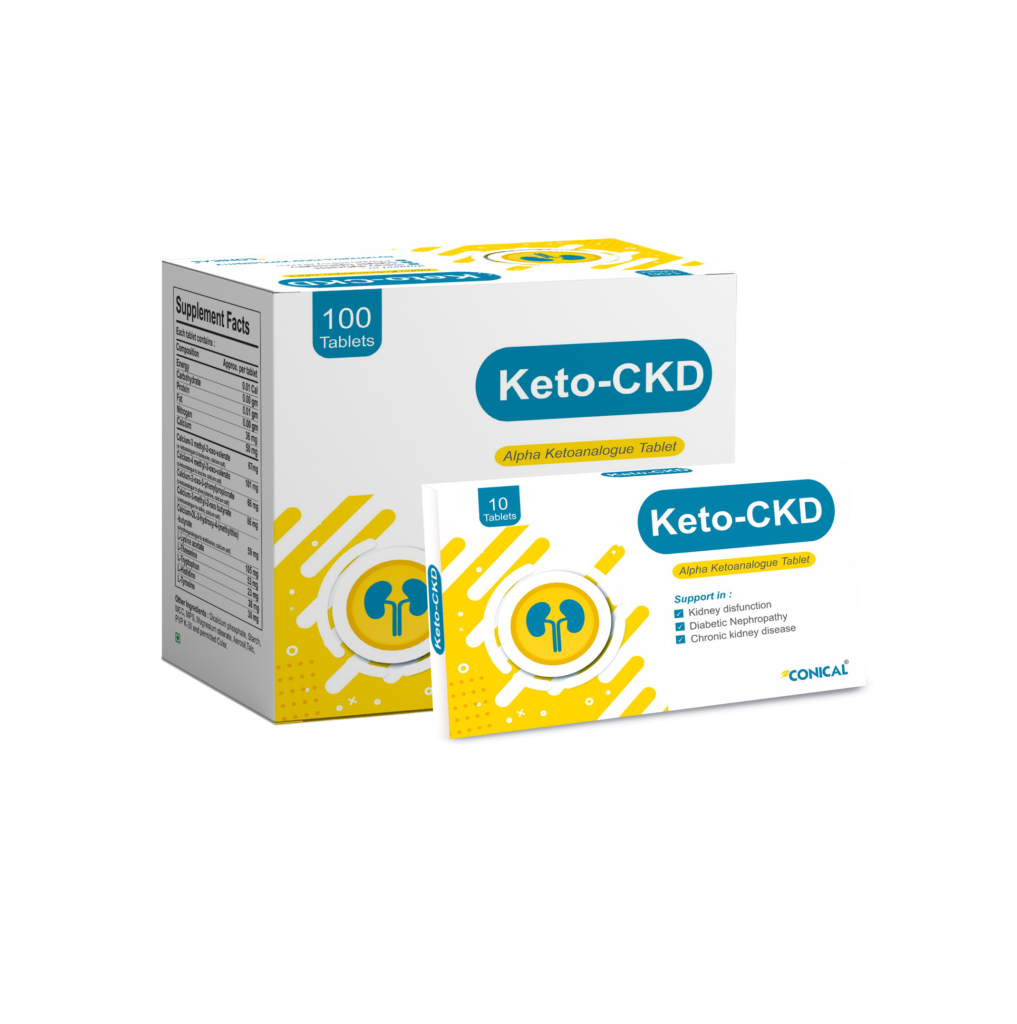Alpha Ketoanalogue Tablet
- Alpha Ketoanalogue Tablet
Therapeutic Class: Supplements
Dosage Forms: Tablets
Brand Name: Keto-CKD™

How it works?
Uses of Alpha Ketoanalogue Tablet
Uses of Alpha Ketoanalogue Tablet
- Slows CKD Progression: Provides essential amino acids without raising urea levels, helping delay chronic kidney disease.
- Reduces Urea Buildup: Limits excess blood urea caused by nonessential dietary proteins especially helpful in kidney failure.
- Lowers Proteinuria: Helps reduce protein loss in urine, a common sign of kidney damage.
- Supports Metabolic Balance: Improves overall metabolism in patients with impaired kidney function.
- Delays Dialysis: Helps preserve kidney function and may postpone the need for dialysis.
- Manages Diabetic Nephropathy: Used to slow kidney damage progression in people with diabetes.
Precautions of Alpha Ketoanalogue Tablet
Precautions While Taking Alpha Ketoanalogue Tablets
- Alcohol: Avoid alcohol, as it may increase the risk of chronic toxicity.
- Calcium Monitoring: May elevate blood calcium levels; regular checks are recommended, especially for kidney patients.
- Pregnancy & Breastfeeding: Use only under medical supervision due to limited safety data.
- Allergy Warning: Not suitable for individuals with known hypersensitivity to any component.
- Drug Interactions: Exercise caution if taking antibiotics or anti-cancer medications.
- Meal Timing: Take during meals to ensure proper absorption and amino acid conversion.
- Tablet Intake: Swallow whole; do not chew.
Dosages administration of Alpha Ketoanalogue Tablet
Dose administration of Alpha Ketoanalogue Tablet:
Unless directed otherwise by a healthcare professional, the recommended dose for adults (approx. 70 kg body weight) is 4 to 8 tablets, three times daily with meals. Do not chew the tablets. Taking them during meals helps ensure proper absorption and conversion into essential amino acids.
Side effects of Alpha Ketoanalogue Tablet
Common Side Effects of Alpha Ketoanalogue Tablets
- Hypercalcemia (High Calcium Levels): May cause fatigue, nausea, or confusion if calcium levels become elevated.
- Digestive Discomfort: Possible symptoms include:
- Nausea
- Vomiting
- Diarrhea
- Abdominal pain
- Rare Allergic Reactions: May include:
- Skin rash
- Itching
- Redness (erythema)
- Breathing difficulty (bronchospasm)
- Important Reminders
- Most side effects are mild and temporary.
- Take tablets with meals to enhance absorption and minimize stomach irritation.
- Seek medical advice if symptoms persist or worsen
Storage instruction of Alpha Ketoanalogue Tablet
Store below 30°C temperature and protect from direct sunlight.
Keep out of reach of children.
Packing details of Alpha Ketoanalogue Tablet
10x1x10 Alu-Alu blister
10x1x10 Alu-Alu blisters are available in an Alu-Alu blister of 10 tablets. Such a blister in a mono carton. Such 10 mono cartons in a unit carton with a package insert.
interested? let’s talk.
Contact us directly to receive full information on the product, the formulation, the science behind it, stability data, and more. Our Business Development Manager is a click away.
Frequently Asked Questions
Questions are useful tools, they open lines of communication; give us information; improve interactions, facilitate analysis, and many more.
